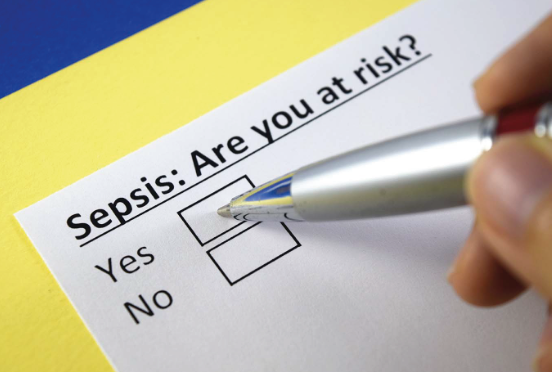Sepsis Recognition in Long-Term Care
Spot early warning signs, respond quickly, and protect residents at risk.

Overview
This program helps long-term care staff identify early signs of sepsis and respond quickly. Using real-life scenarios, learners practice recognizing subtle physical and behavioral changes that may signal infection. The training explains the progression of sepsis, what to report, and how fast response saves lives — especially in older, high-risk residents.
- Early signs, big impact: Spot subtle clues before sepsis escalates.
- Protect high-risk residents: Learn how age, conditions, and infection increase sepsis risk.
- Know what to report: Act fast with clear language and timely communication.
Sepsis Starts Subtle
- Recognize physical and behavioral signs of possible sepsis.
- Understand how sepsis develops from common infections.
- Respond with urgency — what to say, who to alert.
- Support prevention through hand hygiene and basic care.
- Infection Prevention at Work
- Infection Prevention in Long-Term Care
- Abuse & Neglect in Long-Term Care
- Abuse, Neglect, and Exploitation Awareness
- Resident Rights and Responsibilities
- Resident Rights and Responsibilities in Long-Term Care
- QAPI in Long-Term Care: Quality That Works
- Director of Nursing: Leadership, Oversight, and Compliance in LTC
- OSHA Fire Safety
- Fire Safety at Work
- OSHA Fire Safety in Long-Term Care
- Bloodborne Pathogen Safety
- Bloodborne Pathogen Safety in Long-Term Care
- Emergency Preparedness
- Emergency Preparedness in Long-Term Care
- HIPAA: Resident Privacy
- HIPAA Compliance: Protecting Patient Privacy
- Fall Prevention
- Fall Prevention in Long-Term Care
- Dementia Care
- Dementia Care in Long-Term Care
- Communication Skills in Long-Term Care
- Communication Skills for Healthcare Teams
- Communication Skills at Work
- Critical Thinking in Long-Term Care
- Critical Thinking for Healthcare Teams
- Antipsychotic Reduction in Long-Term Care
- Immunization Awareness
- Immunization Awareness at Work
- Depression in Long-Term Care
- Enhanced Barrier Precautions (EBP)
- Enhanced Barrier Precautions in Long-Term Care
- Diabetes
- Managing Diabetes in Long-Term Care
- Sepsis
- Sepsis Recognition in Long-Term Care
- Wound Care in Long-Term Care
- Infection Prevention on Campus
- Immunization Awareness for Students
- Infection Prevention in Healthcare
- HIPAA: Privacy & Security in Healthcare
- Specialized ESRD & Dialysis Center Training
- Fire Safety in Healthcare Settings
- Emergency Preparedness in Healthcare
- Sepsis Awareness & Prevention in Healthcare
- Immunization Awareness in Healthcare
- Diabetes Management in Healthcare
Get Started

Who Should Take This Course
Sepsis risk affects everyone involved in care
- Nursing assistants - Recognize resident changes and notify licensed staff.
- Nurses and charge staff - Act quickly when sepsis is suspected — every minute matters.
- Housekeeping & non-clinical staff - Be aware of symptoms during daily contact with residents.
- Infection Prevention at Work
- Infection Prevention in Long-Term Care
- Abuse & Neglect in Long-Term Care
- Abuse, Neglect, and Exploitation Awareness
- Resident Rights and Responsibilities
- Resident Rights and Responsibilities in Long-Term Care
- QAPI in Long-Term Care: Quality That Works
- Director of Nursing: Leadership, Oversight, and Compliance in LTC
- OSHA Fire Safety
- Fire Safety at Work
- OSHA Fire Safety in Long-Term Care
- Bloodborne Pathogen Safety
- Bloodborne Pathogen Safety in Long-Term Care
- Emergency Preparedness
- Emergency Preparedness in Long-Term Care
- HIPAA: Resident Privacy
- HIPAA Compliance: Protecting Patient Privacy
- Fall Prevention
- Fall Prevention in Long-Term Care
- Dementia Care
- Dementia Care in Long-Term Care
- Communication Skills in Long-Term Care
- Communication Skills for Healthcare Teams
- Communication Skills at Work
- Critical Thinking in Long-Term Care
- Critical Thinking for Healthcare Teams
- Antipsychotic Reduction in Long-Term Care
- Immunization Awareness
- Immunization Awareness at Work
- Depression in Long-Term Care
- Enhanced Barrier Precautions (EBP)
- Enhanced Barrier Precautions in Long-Term Care
- Diabetes
- Managing Diabetes in Long-Term Care
- Sepsis
- Sepsis Recognition in Long-Term Care
- Wound Care in Long-Term Care
- Infection Prevention on Campus
- Immunization Awareness for Students
- Infection Prevention in Healthcare
- HIPAA: Privacy & Security in Healthcare
- Specialized ESRD & Dialysis Center Training
- Fire Safety in Healthcare Settings
- Emergency Preparedness in Healthcare
- Sepsis Awareness & Prevention in Healthcare
- Immunization Awareness in Healthcare
- Diabetes Management in Healthcare
Get Started
